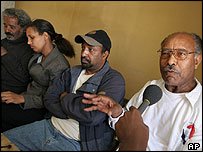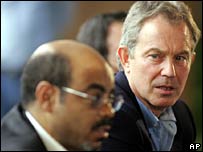Mediators to the rescueIndian Ocean Newsletter N° 1167 04/02/2006In its efforts to calm the opposition and soften the Ethiopian regime, American diplomacy is now calling on university professors to act as mediators.
Professor Donald Levine of the University of Chicago has been in Addis Ababa for a few weeks and was recently authorised by the penitentiary administration to meet the leaders of the Congress for Unity and Democracy Party (CUDP, opposition) in Kaliti prison where they are being held. Before that, this professor of sociology, a specialist in Ethiopian affairs, had met with officials from the Ethiopian government.
In a message sent at the beginning of the year to the ethiopundit web site, Levine stated that he wanted to see Ethiopia move in a new direction in 2006 in which “old hatreds give way to new possibilities of living together harmoniously”. At the same time he announced that he was intending to go to Ethiopia on 7 January for several weeks, “to promote some movement in this direction”. In Addis Ababa, his intention was “to attempt to meet with leaders from all sides”. Afterwards, he should go to the south of the country to inaugurate the Awassa Peace Center on 5 February, as The Indian Ocean Newsletter had already announced (ION 1164).
This move is part of a strategy devised by the United States deputy assistant secretary of state for African affairs, Donald Yamamoto, to use the services of Levine and another intellectual specialised in Ethiopia, Paul Henze, to try to influence both sides of the Ethiopian political conflict. The idea is hence to embark on route to compromise which could lead to the freeing of the opposition leaders and the latter accepting to take up their seats in the Federal Parliament and lifting the order to boycott the institutions and other civil resistance actions.
Meles Zenawi’s new advisorIndian Ocean Newsletter N° 1167 04/02/2006Annette Scheckler, the former head of Voice of America’s (VOA) Horn of Africa service, has become a new special political advisor to Prime Minister Meles Zenawi. Scheckler has been in conflict with VOA since she left the station a few years ago. No official announcement has been made about her new position, but according to information obtained by The Indian Ocean Newsletter in Addis Ababa, this is indeed the case. In fact, Scheckler has just gone to the Ethiopian capital to negotiate the terms of her employment and will subsequently be based at the Ethiopian embassy in Washington, while nevertheless reporting directly to the Ethiopian Minister of Foreign Affairs Seyoum Mesfin. Her work should consist of lobbying American officials in favour of the Ethiopian government. This contract is believed to be the result of an intervention in her favour by one of her friends, Igigayehou “Mimi” Sebhatu, who is a journalist close to the Ethiopian regime. Sebhatu was formerly a VOA reporter in the United States and founded the company Zami Public Connection in Addis Ababa with her husband (ION 1133). Scheckler is the wife of an Ethiopian former member of the Ethiopian People’s Revolutionary Party (EPRP, opposition), whose first name is Dawit who committed suicide last year. She had been in conflict with an Africa executive of VOA, the Ethiopian Negussie Mengesha whom she accused of being a member of the Ethiopian opposition. Ousted from VOA in 1998, she released a twenty page letter to the public in which she contested VOA’s decision and attacked Negussie Mengesha (ION 855).
Chaos in the customsIndian Ocean Newsletter N° 1167 04/02/2006There have recently been some sackings in various departments of the tax administration.
Last week, the new minister of revenue sacked the general manager of the Federal Inland Revenue Authority (FIRA), Woldegabriel Naizghi. The latter was a protégé of the previous Minister of Revenue Getachew Belay who was not retained in his functions in the cabinet reshuffle last year after being beaten in the Parliamentary elections in May 2005. Woldegabriel Naizghi was considered a close ally of Getachew Belay and opponents had in the past gone as far as criticising his alleged Eritrean origin. He also holds an American Green Card (which gives the holder the right of permanent abode in the USA) won in the annual lottery and had gone to the United States a year ago to renew his residence card.
In the wave of dismissals, the general manager of the Ethiopian Custom Authority (ECA), Damtew Demissie was also sacked and replaced by Bogale Negash, the former chief of administration (a sort of mayor) of the Jimma Special Zone. Bogale Negash is a member of the executive of the Oromo People’s Democratic Organisation (OPDO, a component in the government coalition). Solomon Gebreamlak, the head of the intelligence department of the FIRA, was also sacked from his post. A member of the Tigray People’s Liberation Front (TPLF, hard core of the EPRDF in power in Addis Ababa), he is also chairman of the Ethiopian Mineral Development Share Company (EMDSC), the only State firm active in the mining sector.
 ...Tsegaye was a poet, playwright, essayist and theatre director. He has also played a great role for the freedom of expression to flourish in Ethiopia. He was forced to live in exile due to persistent persecution by the regime for his critical writings. He was censored and almost all his theatre works were banned from public scene.
...Tsegaye was a poet, playwright, essayist and theatre director. He has also played a great role for the freedom of expression to flourish in Ethiopia. He was forced to live in exile due to persistent persecution by the regime for his critical writings. He was censored and almost all his theatre works were banned from public scene.  Recently he won the Norwegian authors’ union’s freedom of expression prize for 2005.
Recently he won the Norwegian authors’ union’s freedom of expression prize for 2005. 

 ...By most independent accounts, last May's parliamentary elections were free and fair. But when results revealed that the opposition won overwhelmingly in Addis Ababa, the capital, Meles responded by sweeping up thousands of rioting protesters and arresting political enemies. More than 80 people were reportedly killed in clashes with police last year.
...By most independent accounts, last May's parliamentary elections were free and fair. But when results revealed that the opposition won overwhelmingly in Addis Ababa, the capital, Meles responded by sweeping up thousands of rioting protesters and arresting political enemies. More than 80 people were reportedly killed in clashes with police last year.







 Ethiopia has arrested thousands of members of the Oromo ethnic group over the past three months, according to Amnesty International.
Ethiopia has arrested thousands of members of the Oromo ethnic group over the past three months, according to Amnesty International.